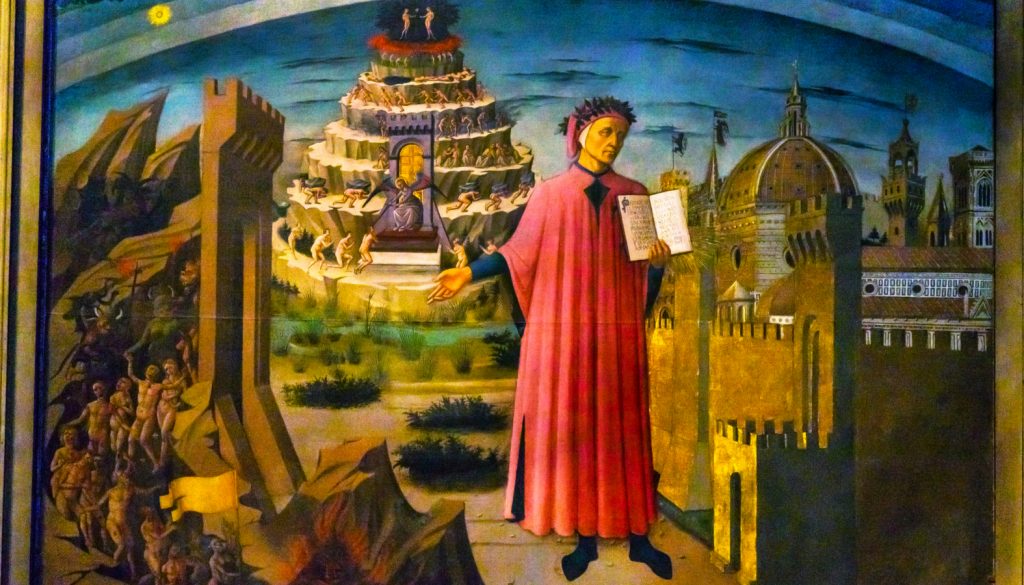The only Marxism I have ever been interested in comes with theoretical professors with names like Groucho, Chico, and Harpo attached to them. I’m even willing to include Zeppo in this mix if it helps deflect any concentration on current affairs.
I usually escape the madness that is 2020 by diving deep into my DVD library and soaking in movies from the 1930s and 1950s, but this year has proven to be more than an adequate foe, and I have found myself going even further back in time — around 700 years.
In a time where we can’t even decide what the proper translation of what a 21st-century pope did or did not mean, it is interesting to note that “The Divine Comedy” by Dante Alighieri, of which there exists no original manuscript, is completely at the mercy of translators. This has probably done some violence to Dante’s art, as he wrote this epic poem in something called “terza rima” [an arrangement of triplets] rhyming scheme.
Now, I wouldn’t know a “terza rima” from a tiramisu [a coffee-flavored Italian dessert], though I have had some rather tasty “tiramisu” in my time. My point is that even though this work of fiction is seven centuries old, it was not written for college professors and intellectuals. Just as Shakespeare always had his “groundlings” in mind when he wrote his comedies, I’m sure Dante’s goal, as any writer worth his salt would desire, was to be read by as many people as possible, and hopefully turn a florin or two.
He was writing for anyone who could read. Granted, during this time in history that was a very small minority, but I think the essence of writing anything is to have anyone who “can, read it. So in that respect, as a person who can read, and still possessing basic tool-making capabilities and a opposable thumb, I believe I’m infinitely qualified to read Dante, even if it has to be an English translation that turns his Italian poetry into my vernacular free verse and I have to visit reliable websites to further understand what many of the verses are referring to.
There’s a reason books last 700 years, even if Dante has been relegated to the sixth circle of hell, which is where you find college literature curriculum. Still, opening up my trusty volume again, looking for escape from the political, medical, and theological troubles of 2020, what did I find but Dante speaking to me from beyond.
When he is being guided through the eighth circle of hell by Roman poet Virgil, he meets the “hypocrites,” who trudge along in a never-ending parade of misery. “They had on mantles with the hoods low down before their eyes and fashioned of the cut that in Cologne they for the monks are made.”
OK, I know it’s a bit of a stretch and probably exposes me as the undereducated imposter I am, but maybe that’s the punishment awaiting public “servants” who make laws regarding COVID-19 that the people must obey faithfully, but which they sometimes bend, mangle, and manipulate for their own convenience.
Picking up Dante’s travels through purgatory, he comes upon a beguiling woman who turns out to be the very siren who gave Ulysses all that trouble on his longer than it should have taken voyage home. Again, something written — even if it’s translated — many centuries ago, leapt out of the page at me. “There’s other good that does not make man happy; ’Tis not felicity, ’tis not the good essence, of every good the fruit and root.” A reference to sirens and a warning that all “good” isn’t necessarily good for us (see “The Social Dilemma” on Netflix).
Even paradise has its issues in “The Divine Comedy,” as Dante must ascend multiple levels and encounters people along the way to bemoan the condition of the Church, the state of things on earth, and provide Dante with a rather clever vehicle for doing a little contemporary commentary. And all the complaints sound oh-so-21st century.
Finally, Dante makes it to the top level of paradise and there, in just three simple stanzas, he says the most universal thing imaginable, and one that transcends time and space, something that Renaissance Italian literary giants and modern American slugs in front of a laptop should keep in mind as the temporal continues to whirl out of control:
“The King, by means of whom this realm reposes
In so great love and in so great delight
That no will ventureth to ask for more…”

